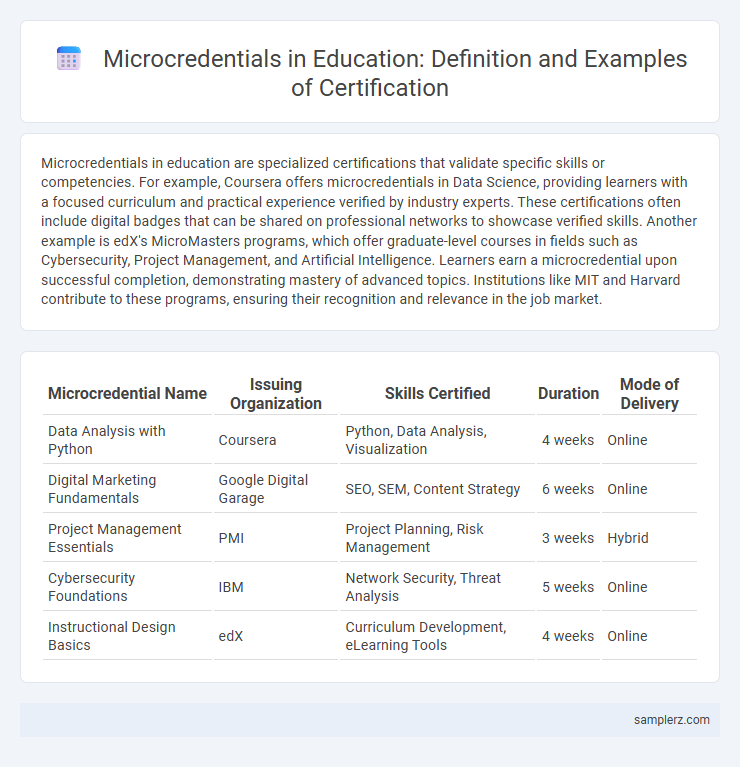Microcredentials in education are specialized certifications that validate specific skills or competencies. For example, Coursera offers microcredentials in Data Science, providing learners with a focused curriculum and practical experience verified by industry experts. These certifications often include digital badges that can be shared on professional networks to showcase verified skills. Another example is edX's MicroMasters programs, which offer graduate-level courses in fields such as Cybersecurity, Project Management, and Artificial Intelligence. Learners earn a microcredential upon successful completion, demonstrating mastery of advanced topics. Institutions like MIT and Harvard contribute to these programs, ensuring their recognition and relevance in the job market.
Table of Comparison
| Microcredential Name | Issuing Organization | Skills Certified | Duration | Mode of Delivery |
|---|---|---|---|---|
| Data Analysis with Python | Coursera | Python, Data Analysis, Visualization | 4 weeks | Online |
| Digital Marketing Fundamentals | Google Digital Garage | SEO, SEM, Content Strategy | 6 weeks | Online |
| Project Management Essentials | PMI | Project Planning, Risk Management | 3 weeks | Hybrid |
| Cybersecurity Foundations | IBM | Network Security, Threat Analysis | 5 weeks | Online |
| Instructional Design Basics | edX | Curriculum Development, eLearning Tools | 4 weeks | Online |
Popular Microcredential Certifications in Education
Popular microcredential certifications in education include Google Certified Educator, which validates skills in using Google tools for classroom management and instruction, and Microsoft Innovative Educator Expert, highlighting proficiency in integrating Microsoft technologies into teaching. Coursera's Teaching Online certificate focuses on effective strategies for virtual education, while ISTE Certified Educator emphasizes digital age teaching competencies aligned with ISTE Standards. These microcredentials provide educators with targeted, skill-based recognition that supports professional development and enhances employability.
Leading Examples of Microcredential Programs
Leading examples of microcredential programs include Google Career Certificates, IBM Digital Badge Program, and Microsoft Professional Program, all designed to validate specialized skills in technology and business. These microcredentials often cover in-demand areas such as data analysis, cybersecurity, and project management, offering flexible, industry-recognized certification pathways. Employers increasingly recognize these programs for targeted skill verification, enhancing career advancement and workforce development.
In-Demand Microcredentials for Teachers
Microcredentials in education, such as Google Certified Educator, Microsoft Innovative Educator, and ESL Teaching Certification, are highly sought after by teachers aiming to enhance digital literacy and specialized instructional skills. These certifications validate competencies in technology integration, language instruction, and classroom management, aligning with current educational demands. Earning microcredentials supports continuous professional development and improves employability in diverse educational settings.
Microcredential Certification: Top Case Studies
Microcredential certifications, such as Google's IT Support Professional Certificate and IBM's Data Science Professional Certificate, exemplify effective models of skill validation through short, focused learning pathways. These programs have demonstrated significant success in enhancing employability by aligning curriculum content with industry demands and providing hands-on experience. Educational institutions and employers increasingly recognize such microcredentials for their ability to rapidly upskill individuals in high-demand fields.
Digital Badges: Recognized Microcredential Examples
Digital badges serve as recognized microcredential examples, showcasing verified skills in specific areas like coding, data analysis, or digital marketing. Platforms such as Credly and LinkedIn Learning issue these badges after rigorous assessments, enabling learners to demonstrate competencies to employers. The digital nature of these badges allows for easy sharing across professional networks, enhancing career development opportunities.
Microcredentials for Professional Development in Education
Microcredentials in professional development for education include specialized certifications such as Digital Classroom Integration, Assessment Literacy, and Inclusive Teaching Strategies. These bite-sized, competency-based credentials enable educators to enhance specific skills aligned with current educational standards and technology trends. By earning microcredentials, teachers demonstrate targeted expertise that supports career advancement and improved student outcomes.
Skill-Specific Microcredential Certification Samples
Skill-specific microcredential certifications include digital marketing badge programs, coding bootcamp certificates focusing on Python or JavaScript, and project management credentials like Agile or Scrum Master certifications. These microcredentials target precise competencies, enabling learners to quickly verify expertise in areas such as data analysis, graphic design, or cybersecurity fundamentals. Employers increasingly recognize these focused certifications for validating practical skills in specialized job roles within education and corporate training sectors.
Online Platforms Offering Microcredential Certification
Coursera offers microcredential certification programs in areas such as data science and project management, partnering with top universities and companies to ensure industry-relevant skills. Udemy provides specialized microcredentials in fields like digital marketing and software development, featuring flexible learning paths and practical assessments. edX delivers microcredential certificates in subjects including cybersecurity and artificial intelligence, backed by recognized academic institutions for enhanced career advancement opportunities.
Short-Term Microcredential Courses for Educators
Short-term microcredential courses for educators include specialized certifications in digital classroom management, formative assessment techniques, and inclusive teaching strategies. These microcredentials typically require 10-30 hours of focused study, offering flexible, skill-specific learning designed to enhance classroom effectiveness quickly. Platforms like Coursera, edX, and LinkedIn Learning provide accredited programs endorsed by educational institutions to support professional development in emerging teaching skills.
Real-World Microcredential Success Stories in Education
The microcredential in Data Analytics offered by Coursera enabled educators to transform classroom data into actionable insights, significantly improving student performance assessments. Teachers who completed the microcredential reported a 30% increase in student engagement through tailored learning strategies based on data-driven decision making. This real-world success story highlights how targeted microcredentials can enhance professional skills and directly benefit educational outcomes.

example of microcredential in certification Infographic
 samplerz.com
samplerz.com